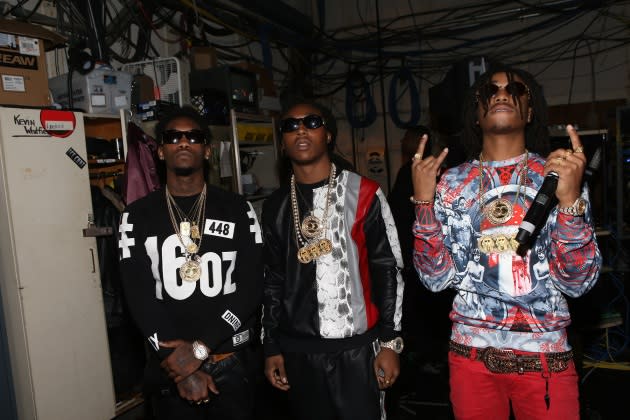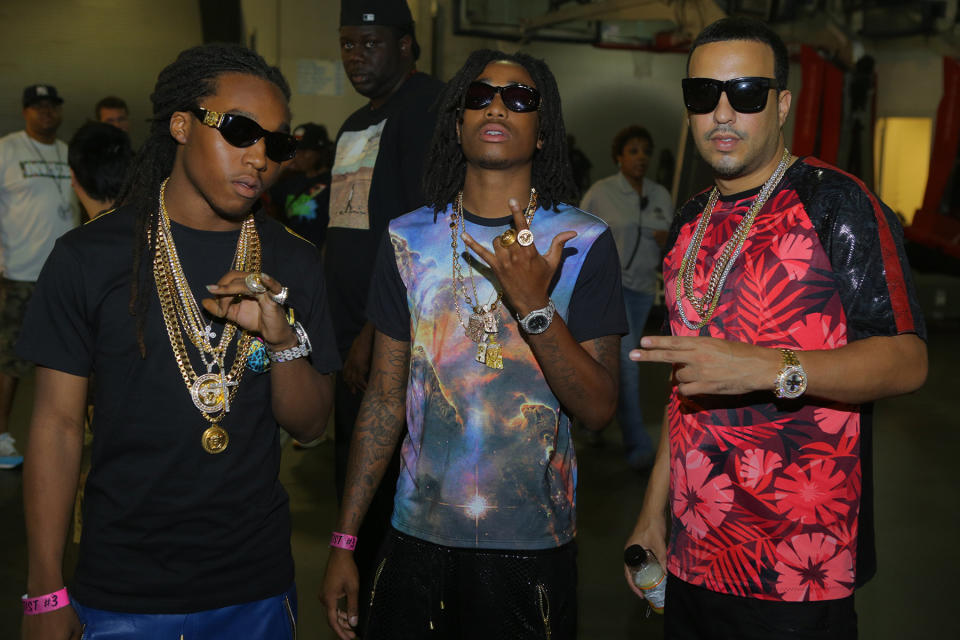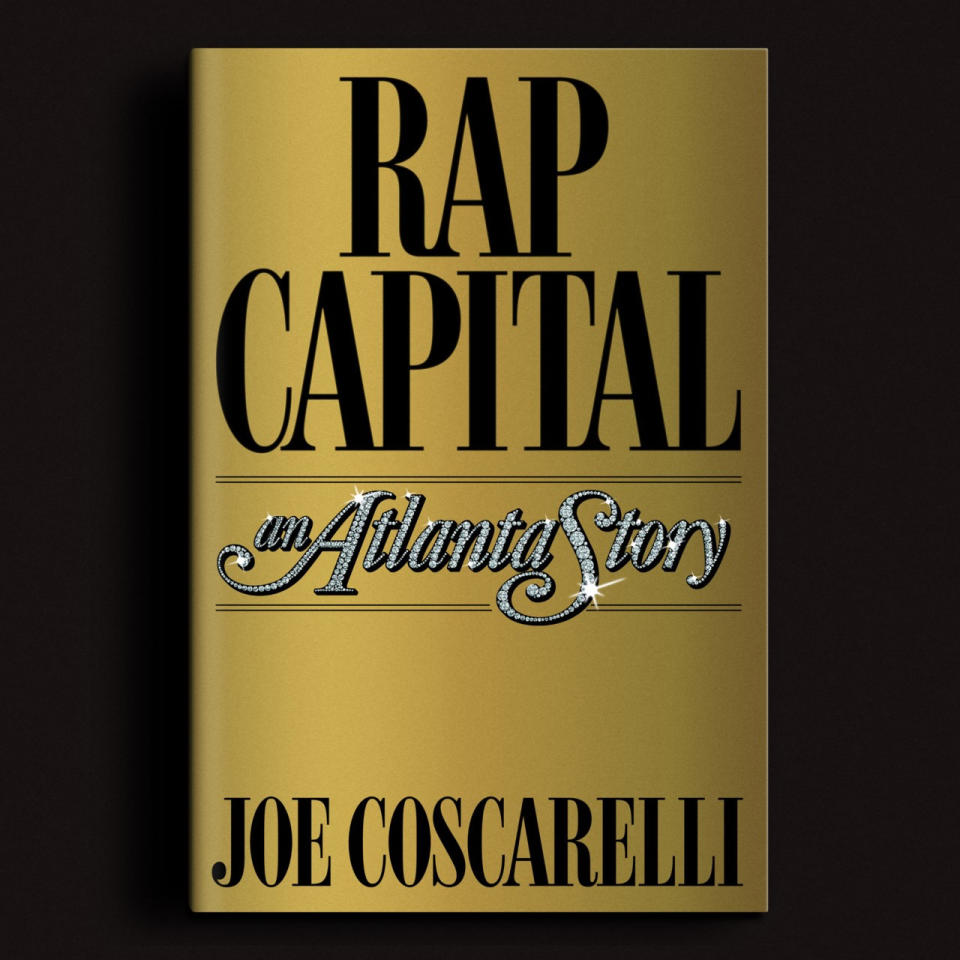The Story of How Migos Met Drake and Changed Rap Forever
- Oops!Something went wrong.Please try again later.

New York Times reporter Joe Coscarelli‘s new book, RAP CAPITAL: An Atlanta Story, is a thorough account of the rise of Atlanta hip-hop as a business and a culture. Through vignettes with the city’s eclectic cast of characters — rappers and businesspeople alike — Coscarelli paints a vivid portrait of the city’s unique wealth of talent. The book’s concern with 2013 until 2020 lands right as the forces of racism and capitalism, a constant source of tension within hip-hop, confronted the dawn of the streaming era. In the chapter on Migos, excerpted below, we see how a viral hit can change everything overnight. Coscarelli shows us how Migos’ breakthrough hit “Versace” came about almost like a stroke of luck. The track was a hint of what was to come, as Migos would go on to dominate the mainstream and alter the sound of rap for good.
More from Rolling Stone
Right After Takeoff's Death, Gruesome Videos Spread Like Wildfire
Drake, 21 Savage Reveal 'Her Loss' Cover Art After Delayed Album Release
Takeoff Killing: Police Hunt for Suspect as Details Remain Elusive
By May, Migos had released an updated, souped-up video for “Bando,” their runaway street hit, featuring Quavo and Takeoff in better clothes and designer sunglasses, with more gold chains and fatter piles of cash. In place of Offset was an army of supporters rocking their crisp “FREE OFFSET” shirts, and poster boards held triumphantly in the background advertised the trio’s upcoming release: a mixtape called YRN, or Young Rich N——s, including nineteen songs and features by Gucci Mane and Soulja Boy.
The mixtape was set to come out on June 13, a few days ahead of Takeoff’s nineteenth birthday, and also the Thursday before Hot 107.9’s annual Birthday Bash concert that Saturday at the Philips Arena in downtown Atlanta—a local hip-hop holiday that guaranteed the presence of rap heavyweights in town. In anticipation, Quavo and Takeoff went on a promotional tear, spreading their YRN posters and Offset T-shirts—along with another that said trap in the Gap font—across Georgia, hit- ting a different club and radio station almost every night, from Atlanta to Decatur to Valdosta. Coach also had them cater to the more diverse constituency at Beer and Tacos, a recurring party in the city that combined the hood kids and hipsters in one sweaty mass.

But Quavo had his heart set on appearing at Birthday Bash, despite not being on the official bill, which included 2 Chainz and B.o.B. He told Coach, however hyperbolically, that he’d quit music if they couldn’t perform. Why else have a known manager in your corner? It was up to Coach K to make it happen.
Across town, not long before the show, DJ Drama, the Atlanta mixtape king who had a scheduled slot at the concert to bring out a parade of special guests, was considering who he could invite that would really make the crowd react. At his Means Street Studio in the historic district of industrial warehouses northwest of downtown, Drama threw out some names: Rich Homie Quan, an Atlanta guy with a rising rap-sung hit in “Type of Way,” was a sure thing. Trinidad James, the flamboyant local jester whose “All Gold Everything” had become a crossover smash, was another. And this young guy from Philadelphia named Meek Mill seemed like a safe bet. But when somebody mentioned Migos, a debate kicked off.
“You gon’ disappoint me,” one guy told Drama at the mere suggestion. “Are they from here?” another wondered.
“Yes!” one out-of-towner responded insistently.
The pro-Migos enthusiast just happened to be Drake, the reigning prince of hip-hop and one of its most reliable hitmakers, who was quickly becoming a Canadian, biracial on-ramp to the pop mainstream for emerging rappers. Drake was someone who treated regional rap music like an obsessive fan, constantly scouring the internet for new sounds. So as the barbershop-style parley picked up, he asserted himself as the resident Migos expert and defender.
“Don’t get it twisted, I fuck with Migos,” Drake told the skeptical room. “Yo, I’m just letting you know they have a wave. I’m just letting you know.”
The pop-star rapper even named some lesser-known Migos tracks from YRN that he already loved, like “Adios” and “Pronto,” even though the tape had just come out. DJ Drama, who had seen the Migos movement growing firsthand, ultimately agreed: if Birthday Bash was the premier showcase of current Atlanta rap, then Migos had to be there. It would be the first time that the group ever rehearsed for a show. But it was what happened backstage at Birthday Bash that would help make Migos and Quality Control unstoppable.
Quavo was eating wings when it happened, his hands slathered in sauce. But Drake, who was appearing as a special guest with 2 Chainz, didn’t seem to mind as he approached the relatively unknown rappers. Just like he had at Drama’s studio, Drake rattled off his favorite Migos songs like an eager fan—“Pronto,” “Bando,” “Chirpin”—this time to the young guys who’d actually made them. Migos couldn’t let the moment pass without taking up the multi-platinum rapper on his fandom. “We’re looking at him like, You Drake!” Takeoff said later.
The star-struck rookies suggested making a song together, likely knowing that the promise of collaboration could be a conversational crutch among rappers, one that’s often empty—like a regular person tell- ing an acquaintance that they should catch up sometime during a chance run-in. But Drake really was a fan—and a savvy talent scout—one who was early enough that he couldn’t risk missing the Migos wave. Sure enough, he texted a few days later asking for something to work with.
Coach and P assumed that Drake would jump on one of the YRN tracks that were already bubbling, like “China Town” or “Dennis Rodman.” They sent him three options. Instead, within a few days, Drake had added a verse on “Versace,” uploading his version of the song to SoundCloud exactly a week after Birthday Bash. Within days, Justin Bieber had posted a video of himself rapping along. Almost instantly, Migos had moved beyond Atlanta and was approaching the rap stratosphere.
“Versace” was like “Bando” on Red Bull and Ciroc, reveling in high luxury instead of street grime. In barely three minutes, the name of the title brand was repeated nearly two hundred times—including thirty-six in the chorus alone, which featured no other words. The rest of the lyrics were free-associative and borderline nonsensical, with references to the Illuminati, John Gotti, Tony the Tiger, an obscure Eddie Murphy character and the Disney film The Mighty Ducks. To this day, many find the song infuriating, though none deny that it’s sticky. And whereas “Bando” merely sounded like it was produced by Gucci Mane’s go-to collaborator Zaytoven, the skittering start-and-stop beat for “Versace” actually was.

The song represented a full-circle moment for the group and the producer. Zaytoven had been the one who first showed Migos’ original “Bando” music video to Gucci. (Yung LA, the Atlanta rapper who showed it to the producer, only did so because he thought Zaytoven had made the beat.) But even in 2013—years after his first mainstream hit, Usher’s “Papers,” co-written with Gorilla Zoe—Zaytoven was still working in a barbershop cutting hair when he wasn’t defining the trap sound by making piano-based beats for Gucci and his associates. It was the success of “Versace” that finally made Zaytoven give up his nine-to-five.
But as massive as the song got in Atlanta clubs and beyond—and even with its eventual recognition by fans and critics as one of the defining rap songs of the decade—“Versace” barely hit Billboard, peaking at number 99 on the Hot 100 and never cracking the top 20 on the R&B/ hip-hop or rap charts. Though a net gain from an attention perspective, Drake’s involvement proved frustrating to Migos and Quality Control when the upstart record company failed to get the legal clearance from Drake’s major label to sell the new version of the song on iTunes and other official retailers.
Coach and P saw the commercial roadblock as a kind of retribution from the larger industry that loomed over them. At the time, they were adamant about keeping Migos independent, and Quality Control believed it was being frozen out by the system for failing to sign away their prized asset. Since Drake took up so much oxygen on the track—and also put his verse first—radio and club DJs could cut the song off before Quavo, Takeoff or Offset even started rapping, leaving Migos as a footnote on its own breakout track.
In many ways, Migos was still ahead of its time in 2013, and for years after, both in sound and in business. The music industry at the time was thrashing in place, struggling to recover from the bottoming out of the CD market. And while rap mixtapes were booming online, the major labels had not yet found a way to really profit off internet attention beyond track downloads, which favored white pop stars with more affluent audiences. Spotify had quietly debuted in the United States in 2011, but it would be a while before the service caught on. In 2012, there was a glimmer of hope when the labels saw their first rise in global music revenues since 1999. But 2013 saw another dip as revenues fell by nearly four percent.
At the same time, street rap was still being overlooked as a niche concern. In the year of YRN and “Versace,” the bestselling album was by the British boy band One Direction, followed by Eminem (who had just turned forty-one) and Justin Timberlake. The biggest songs were “Blurred Lines” by Robin Thicke, which featured TI in full pop-crossover mode, and “Thrift Shop” by the white rapper Macklemore, a track that decried rap materialism. “Versace,” in contrast, was brash, electric and proudly regional, the soundtrack to an underground bubbling far enough over that anyone paying attention to the swell should’ve seen that it could not be contained.
But Migos, if nothing else, had velocity—and, lately, its own money. The group’s first summer under Quality Control was a string of weeks- long stretches with no breaks as gigs bled into press appearances and trips out of town to show up at events and meet a national media that was eager to introduce the faces behind an urgent update of the trap boom. With all that came higher prices for paid appearances, starting with club walk-throughs—the nightclub cameos that might include standing on a booth or table while the DJ plays your songs over and over again—and eventually proper concerts at colleges and ticketed venues.
All QC had to do was keep pouring gasoline on the Migos fire. In August, the trio released another mixtape, Streets on Lock, with Rich the Kid. September saw a shiny $100,000 video for “Versace,” filmed at a rented mansion in Miami complete with Zaytoven at a grand piano, a Donatella Versace look-alike and a cheetah. There was also, for the first time, luxury product placement, including a bottle of tequila on the piano that netted the group a few thousand dollars, and the clumsy appearance of an app that Migos would later record a whole song about. (The startup, Bedloo, never took off.) In October, there was another mixtape. In December, they featured on another. Then February. Then February again. In all, Migos would have a dozen street-level releases before ever bothering with an official album.
Along the way, the group became whole again. As “Versace” crested in the fall of 2013, Offset was released from DeKalb County Jail, having served his eight months for violating probation. “I’ve been through it before, but that’s my last go-round,” he told The Fader in an interview upon his release. “There’s money to be made, ain’t no more playing. That’s the old me, I threw that away.” Takeoff compared Migos’ situation with Offset to a game of double Dutch: “He can just jump right in.”
The guys were elated to pick Offset up as a free man, with fresh piles of cash in hand for their absent brother. Coach asked right away if he wanted to head straight to the mall. But Offset had other plans.
“I wanna go to the studio,” he said.
Excerpted from RAP CAPITAL: An Atlanta Story by Joe Coscarelli. Copyright © 2022 by Joe Coscarelli. Reprinted by permission of Simon & Schuster, Inc.
Best of Rolling Stone

